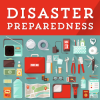No matter where you and your senior loved one live, you may encounter a natural disaster or other event that requires an emergency plan. If you’ve never thought about what to do in case of a fire, tornado or flood, now’s a great time to prepare. Here are some steps to take in recognition of National Preparedness Month:
Consider potential disasters
In order to fully prepare, you must have an understanding of what events could possibly displace you and your senior loved one from your home. As a caregiver, it is your responsibility to identify potential risks and ways to address them. First, look at the area where you live. Has it been historically prone to weather disasters like tornadoes, forest fires, mudslides or hurricanes? Add these happenings to your list so you can later come up with action plans. Also consider house fires, a tree falling on your home or even you falling sick.
Talk about emergency alerts
The Department of Homeland Security suggests all households make a plan for how they will receive emergency warnings and alerts. Thanks to technology, this is as easy as setting up weather alerts on your phone or checking cable television to catch the news. You could also ask a family member to help you with this in the event that you are not at home with the senior and need someone to alert him or her of an emergency. Keep a battery-powered radio on hand in the event that your phone runs out of battery and you lose power.
Establish evacuation plans
Now that you’ve identified risks and how you will learn about them, come up with ways to get yourself and the senior you care for out of your home during an emergency. Take into account the individual’s mobility. Will he or she need a wheelchair as the fastest means to exit your home? Would having a walker be a good idea for stability and balance? What door should you take and where will you go once you have left? The final part of an evacuation plan is the location you will head to after leaving home. If your house is on fire, for example, you’d go a safe enough distance away that you and the senior would be out of danger. Perhaps go to a neighbor’s house down the street if possible. Leaving before a hurricane may require a more elaborate plan of traveling out of state via car or plane, so be sure to discuss your options.
If you found an error, highlight it and press Shift + Enter or click here to inform us.



